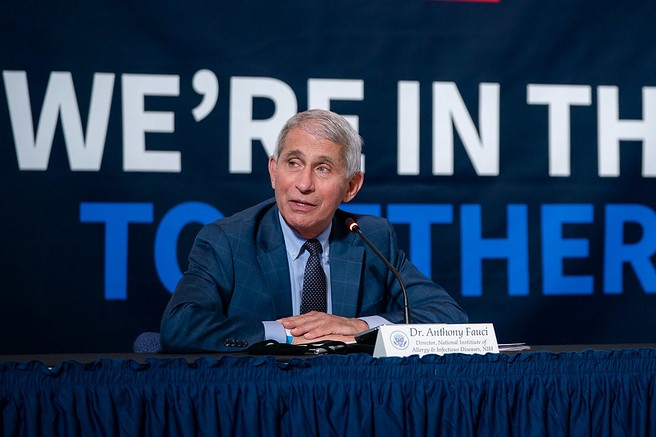The 9/11 attacks gave us the heightened security theater now on display in all U.S. airports. Day after day for the last two decades, Transportation Security Administration agents have patted down travelers from teens to the elderly, looking for weapons that nobody expects to find. While airplane cockpit doors are now locked to prevent hijackings, the pat-downs remain.
And now we have pandemic hygiene theater to give uninformed people a false sense of control and sustain their fear of the virus.
Think of the number of hours that schools, restaurants and other businesses spend wiping down surfaces to prevent COVID-19 transmission even though we’ve known since last July that this wiping isn’t necessary. Yet Americans continue to spend untold hours and dollars wiping surfaces to provide the appearance of virus protection to their patrons.
In Arlington, Virginia, my kids’ schools have implemented overly stringent and frankly illogical measures that create barriers to accessing an effective education. For starters, the schools have only welcomed back a subset of their student population for two days a week for in-person education. They’ve also reduced the number of actual teaching days from five to four, during which the kids get only half of the education time they used to get. But they do spend time and energy wiping down surfaces and making students wipe their desks. They’re also instructed daily to “limit touching of surfaces to only when is necessary.”
That isn’t the only form of hygiene theater some schools perform.
Every morning I must fill out a form for each of my kids, assuring the school that they have no fever, yet the school still has temperature checks at every entry point of the building. The alleged need for temperature checks is one stated reason for why kids cannot be taught on site more than two days a week and why more kids can’t be brought back for in-person instruction.
These theatrics continue even though Dr. Anthony Fauci admitted last August that temperature checks “are notoriously inaccurate.” Nobody should be surprised. We’ve known for months that up to 40% of Americans with COVID-19 are asymptomatic.
Our schools also claimed that they couldn’t bring the kids back last fall because students must stay 6 to 10 feet apart. I’m reminded of this every morning when I electronically agree to my kids following the safety standards. That’s 4 feet more than even the CDC recommended for months. And even the origin of that 6-feet rule is mysterious. It’s twice the length recommended by most countries and the World Health Organization.
Adding insult to injury, the CDC finally changed its guidelines from 6 to 3 feet, yet Arlington schools still require distances of at least 6 to 10 feet and universal mask use. Never mind that teachers have been prioritized for vaccination, and research shows that schools don’t increase COVID-19 spread in the community.
And as the Manhattan Institute’s Connor Harris notes, the evidence behind some of these mask mandates “turns out to be quite weak.” The “Widespread use of masks throughout the United States and Europe has failed to stop massive pandemic waves in the fall and winter,” he observes, adding that “Preliminary signs also suggest that mask mandates may be causing considerable harm. Several state governments have recently rescinded their mask mandates, and a look at the science suggests that more should consider following.”
Likewise, for a number of valid social-development and health-related reasons, Harris’ colleague John Tierney concludes that “mask mandates are especially cruel to young children.” As Tierney’s research explains, “The CDC’s policy placates the leaders of teachers’ unions but flouts the guidance issued jointly by UNICEF and the World Health Organization.”
These theatrics play out in a world where many of us reuse our face masks such as the one we keep in our car, reuse surgical masks many times or wear masks below our noses. There are many actors starring in this daily health drama. The same applies to the number of Americans who continue to wear masks outdoors despite evidence that transmission rarely takes place outside. And the same will be said of those who, although vaccinated, will continue to wear masks long after we reach herd immunity.
While some of these examples may seem silly, hygiene theater has huge costs and wastes precious resources. It also keeps Americans unjustifiably scared of the virus while promoting the delusion that with enough such measures, we can finally live in a world free of risks.
The bottom line is this: Politicians make a lot of promises, but we shouldn’t always believe them.
Veronique de Rugy is the George Gibbs Chair in Political Economy and senior research fellow at the Mercatus Center at George Mason University. Her primary research interests include the U.S. economy, the federal budget, cronyism, taxation, tax competition and financial privacy. Her popular weekly columns address economic issues ranging from lessons on creating sustainable economic growth to the implications of government tax and fiscal policies. She has testified numerous times in front of Congress on the effects of fiscal stimulus, debt, deficits and regulation on the economy.
De Rugy blogs about economics at National Review's The Corner. Her charts, articles and commentary have been featured in a wide range of media outlets, including the "Reality Check" segment on Bloomberg Television's "Street Smart," The New York Times' Room for Debate, The Washington Post, The Wall Street Journal, CNN International, "Stossel," "20/20," C-SPAN's "Washington Journal" and Fox News Channel. She was also named to the Politico 50, the influential media outlet’s “guide to the thinkers, doers and visionaries transforming American politics” in 2015.
Previously, de Rugy has been a resident fellow at the American Enterprise Institute, a policy analyst at the Cato Institute and a research fellow at the Atlas Economic Research Foundation. Before moving to the United States, she oversaw academic programs in France for the Institute for Humane Studies Europe.
She received her master's degree in economics from Paris Dauphine University and her doctorate in economics from Pantheon-Sorbonne University.
Read De Rugy's workhere.






